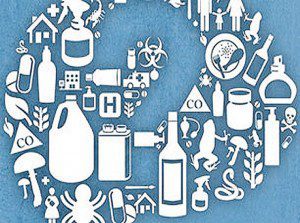 As you begin spring cleaning and work on the yard, follow these simple tips to keep your family safe:
As you begin spring cleaning and work on the yard, follow these simple tips to keep your family safe:
Household cleaners and other products
• Keep poisons in the containers they came in. Do not use food containers (such as cups or bottles) to store household cleaners and other chemicals or products. These should be stored away from food.
• Read and follow the directions for use of products and their disposal. Do this before using the products. Follow the advice carefully and never mix chemicals or household cleaners or detergents. Doing so can create a poisonous gas.
• Turn on fans and open windows when using chemicals or household cleaners, and never sniff containers to see what is inside.
• When spraying chemicals, direct spray nozzle away from people and pets.
• Even in small amounts, windshield wiper fluid is poisonous. If swallowed, it can cause blindness or death to people and pets. Use it carefully to avoid spraying it in someone’s face.
• Chemicals can burn the skin. Drain openers, toilet cleaners, rust removers, and oven cleaners can cause such burns.
• Liquids made from petroleum, such as gasoline, kerosene, charcoal lighter fluid, paint thinner, baby oil, lamp oil, and furniture polish, are poisonous.
• If these items are swallowed, they can easily get into the lungs. Even a small amount can cause breathing problems. The liquid coats the inside of the lungs and prevents oxygen from entering the blood stream.
Pesticides
• Pesticides (pest killers) can be taken in through the skin or inhaled and can be extremely poisonous. Even leather shoes and gloves do not offer full protection. Stay away from areas that have been sprayed until the spray has dried or for at least one hour.
• Wear protective clothing when using bug spray or other spray products. Put on a long-sleeve shirt, long pants, socks, shoes, and gloves. Remove and wash clothing after using chemicals.
• If pesticides are splashed onto the skin, rinse with running water for 15 to 20 minutes. If pesticide contacts clothing, take off the clothing before rinsing skin.
• Many garden chemicals are poisonous if swallowed or inhaled by children and adults.
What Can You Do?
In an emergency:
If you or someone you know may have been poisoned, call the toll-free Poison Help line right away at 1-800-222-1222, which connects you to your local poison center. If the person is not breathing, call 911. Do not wait for signs of a poisoning before calling the Poison Help line. When you call, you will speak with a poison expert at your poison center. Use this emergency checklist to guide you on what information to tell the poison expert on the phone.
Also remember:
• Do not panic. Not all medicines, chemicals, or household products are poisonous. Not all contact with poison results in poisoning.
• Follow the advice you receive from your poison center.
Some additional first steps include:
• If the person inhaled poison, get to fresh air right away.
• If the person has poison on the skin, take off any clothing the poison touched. Rinse skin with running water for 15 to 20 minutes.
• If the person has poison in the eyes, rinse eyes with running water for 15 to 20 minutes.
Your poison center can give you other first-aid advice and may save you from a visit to the emergency room.
Source:
http://www.poisonhelp.hrsa.gov







